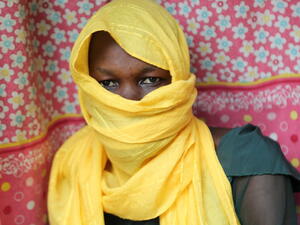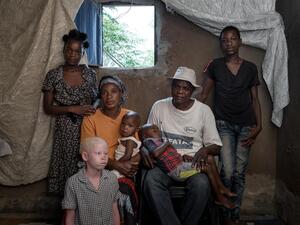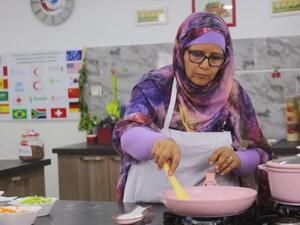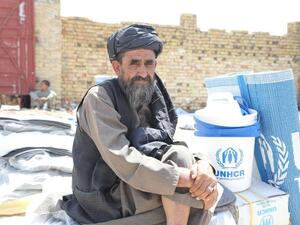UNHCR, WFP concerned about food cuts in Zambia
UNHCR, WFP concerned about food cuts in Zambia

Refugees at Kawambwa camp queue up for their half rations of food.
GENEVA/LUSAKA, Dec 10 (UNHCR) - Refugees in Zambia have seen their food rations halved in the last two months, said the UN refugee agency, warning that the deteriorating situation was not only detrimental to the health of the refugees, but could also compromise the return operation to Angola.
The urgency of the food situation in Zambia was highlighted by both UNHCR and the World Food Programme at a news briefing in Geneva on Friday. Zambia hosts more than 191,000 refugees, mostly from neighbouring Angola, the Democratic Republic of the Congo and Rwanda.
WFP spokeswoman Christiane Berthiaume lamented the poor donor response to a $3.2 million appeal launched in September to cover the food needs of refugees in Zambia until the end of the year. As a result, she said, the agency has had to halve the rations of pulses in October and of cereals in November. Food distribution in general will be halved unless funds are forthcoming.
"In the longer run, the food shortage could compromise the repatriation programme to Angola," said UNHCR spokeswoman Jennifer Pagonis. "The refugees have been away from their homes for decades. They can't go back and rebuild their lives if they are malnourished; they won't have the energy for agricultural activities."
She acknowledged the competing demands on the international community, but noted that repatriation is a solution that needs support now.
"We talk about donor fatigue, protracted refugee situations, but this is on the way to being resolved now," said Pagonis. "Donors have supported us through the darkest moments of the Angolan war. Now we have the solution in sight, and it's working. We need help now."
She noted that sufficient food was crucial to ensure that refugees return from Zambia to Angola in good health, and stay healthy with a full package of food rations upon their repatriation. More than 172,000 Angolan refugees have returned home with UNHCR assistance since the Luena peace agreement of April 2002 ended 27 years of civil war in Angola.
Kawambwa refugee camp in north-eastern Zambia is one of the many camps affected by the recent food cuts. As of November, the 21,000 refugees here have been surviving on half their usual rations of maize and pulses.
"This means that the energy value of the daily food basket decreased from 2,154 kcal to 1,197 kcal. We can now only provide 55.8 percent of the necessary energy value," said Omer Abdel Hameed, who heads the WFP office in Kawambwa camp.
When the cuts were first implemented in November, the refugees staged a riot, pelting stones at UNHCR cars and injuring several staff members. They had calmed down by the recent food distribution in early December, but were still visibly agitated. "Half rations are not enough!" they said. "Should we only eat from the 1st to the 15th of each month and then fast?"
Albertine Lubinga, the camp's senior nurse, said she has not seen any cases of malnutrition yet. Firstly, the nutrition status of the camp population before the cuts was very good. Secondly, families still had stocks to get them through November. However, she expects worse to come: "The current rations are not enough. A few weeks down the line, severe malnutrition will occur. It usually starts with the under five-year-olds, then symptoms start showing in older and sick people, in school children, pregnant women and lactating mothers."
UNHCR field officer Napaporn Bunkalya is worried about the long-term impact of food scarcity in refugee protection. While many men find casual labour outside of the camp, women suffer more as they cannot leave their children unattended in search of a job. He fears that the desperation for money and food may fuel a sex trade, resulting in a rise in diseases, petty crime and other social problems.
Thanks to the current rainy season, the refugees are temporarily coping with the food shortage by supplementing their diet with ripe mangoes and various edible wild leaves in the forest. Some refugees have their own little gardens where they cultivate tomatoes, eggplants and melons. Two refugees are trying to start a poultry farm. During the ongoing harvest in surrounding villages, men can find work for food or money. In the woods, the children gather chikolokwe, scrumptious mushrooms the size of frying pans, which they sell to the locals.
The situation will deteriorate, however, when the dry season sets in.
But once again it is the female heads of households who have the greatest difficulties to get by. A young widow and mother of two toddlers, has no possibility to get additional supplies. She points to her children: "We exist on what you give us," only to add in desperation: "Instead of starving slowly I think of going back to eastern Congo and get my self killed by a bullet. That is quicker!"
By Melita H. Sunjic in Zambia
and Jennifer Pagonis in Geneva








